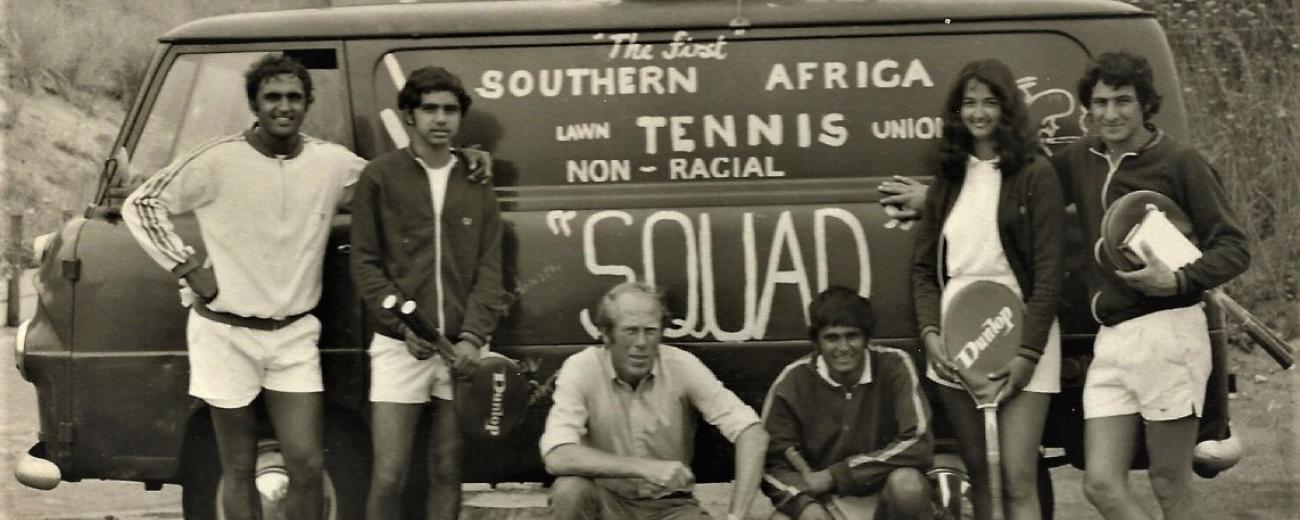
Tennis, Apartheid and Social Justice

Key information
- Date
- Time
-
5:30 pm to 7:00 pm
- Venue
- Brunei Gallery
- Room
- Brunei Gallery Lecture Theatre (BGLT)
About this event
Speaker: Prof Saleem Badat (University of the Free State)
About this event
The website of the All England Lawn Tennis Club (AELTU) proclaims that it is ‘a diverse and inclusive organisation which is committed to confronting and eliminating all kind of ‘discrimination’, including ‘race, religion/belief or gender’. That, of course, is to be welcomed.
But the AELTU has a case to answer concerning the exclusion of a young black South African from the 1971 Wimbledon men’s junior tournament.
Hoosen Bobat, then 18, and a first-year university student, would have become the first black South African to play in the men’s junior tournament had he not been excluded through the conniving of the racist, exclusively white South African tennis union, the International Lawn Tennis Federation (ILTF), and ultimately the AELTU.
The story of the exclusion is vividly described in Tennis, Apartheid and Social Justice: The First Non-Racial International Tennis Tour, 1971, authored by humanities research professor Saleem Badat of the University of Free State. Badat, former vice-chancellor of Rhodes University, is author of various books with a social justice theme.
His previous book, The Forgotten People: Political Banishment under Apartheid (Brill, 2013) narrated the banishment of rural leaders opposed to apartheid to desolate areas (South Africa’s ‘Siberias’) for long periods. Banishment was a repressive instrument the British colonial administration introduced in the 1890s to silence its opponents.
Tennis, Apartheid and Social Justice, documents the political, social and sporting conditions under which the 1971 tour occurred, the dynamics of the tour, the talented young black tennis players who undertook it, the tournaments in which they participated, how they fared, their challenges and adventures, the tour’s impact on them, sporting wise and personally, and the lessons that were learnt.
The book argues that post-1994 there has neither been fitting recognition nor restitution or reparations for outstanding apartheid-era black tennis players and that the apartheid legacy continues to affect tennis today. It warns against amnesia about South Africa’s history and insists on the need to assiduously recover and understand the past, as the only basis upon which a democratic South Africa can build its future.
It contends that a Truth and Reconciliation Commission on sport was needed to lay bare apartheid sports crimes, their systemic underpinning and the organisations and individuals that perpetrated the crimes.
Speaker biography
Saleem Badat is Research Professor in the History department at the University of the Free State.
His political awakening began in the early 1970s through playing non-racial tennis under the South African Council on Sport, which popularised the slogan ‘No normal sport in an abnormal society’.
In the 1980s, Saleem headed Grassroots, an anti-apartheid Cape Town community newspaper. He was detained several times under security laws and eventually banned, forbidden from setting foot in media and educational institutions and restricted to his home in Athlone. The Truth and Reconciliation Commission ruled that his human rights were violated and awarded him reparations.
A PhD graduate of the University of York, Saleem’s academic career began in the late 1980s at the University of the Western Cape. In 1999, he became the first chief executive of the Council on Higher Education, the policy advisory body to the minister of higher education.
Between 2006 and 2014 he served as the first black vice-chancellor of the historically white Rhodes University. Thereafter, he became the first Program Director of International Higher Education at the Andrew W. Mellon Foundation in New York. His research is concerned with equity, redress, and social justice in and through universities, and the transformation of universities.
He currently leads a research project on the histories of universities in South Africa. He is researching books on his period at Rhodes University and on the idea of the university in South Africa from colonialism to today.
Registration
This event is free and open to public. Please note that this event will be held in-person only.
To attend on campus, please register via Microsoft Forms.
- Organiser: SOAS Centre of African Studies
- Contact: cas@soas.ac.uk

